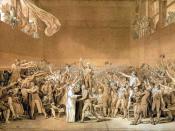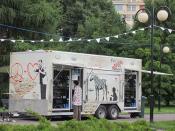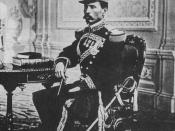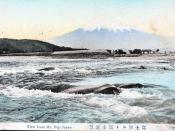A Revolution is like a Hurricane
By Adin Bonapart
A hurricane is like the French Revolution because a hurricane gathers strength out at sea until it reaches the shore, reshaping the surface of the land. Prior to 1789, the frustration of the French people was building like a hurricane out at sea. All the people in the Third Estate were heavily taxed and did not have the king's support. The French citizens, or Third Estate, made up 95% of the population of France. Of that 95%, 80% were poor peasants. As the people in the lower classes became fed up with rising food prices and higher taxes, the hurricane grew stronger. Hurricanes have power depending on their size, the French Revolution held its power in the numbers of the Third Estate. Before the hurricane hit, there were a few warning 'splashes' as poverty-stricken peasants turned to theft for necessary food.
The hurricane was led in the right direction by enlightened thinkers such as Montesquieu and Jean Jacques Rousseau, they were in favor of a change in governmental powers. The Hurricane hit in the summer of 1789. The Third Estate formed the National Assembly and pledged to form a new constitution, ending the monarchy. This was called the Tennis Court Oath. The Nobles and Clergymen joined the National Assembly and together eliminated the feudal privileges of the 1st and 2nd estates. The hurricane had begun re-shaping the French government and 'leveled the playing field' for peasants. Hurricanes are very destructive and they are impossible to control thus they do not always do what they were anticipated to do. From this changing society developed a wave of panic called the Great Fear. Rumors and chaos spread and the peasants rioted for food and other civil liberties. The hurricane's destruction destroyed the lives of many and others had to flee. It had re-distributed the land and changed French life.
A hurricane is similar to the Russian Revolution because it brought change to Russia by force. This hurricane brewed until 1917, when things became violent. The revolution was caused by the lower classes being exploited and oppressed. Peasants needed more land, workers wanted better working conditions, and ethnic minorities wanted independence. All lower classes were subject to unjust treatment from the Czars and their reign. The lower classes were the central foundations that formed the hurricane. At the time Czar Nicholas II was in charge of the Russian people. He saw these problems and could predict the hurricane hitting Russia. Instead of dealing with the individual problems themselves, he tried to suppress the hurricane. He tried to create a program of fear to control any opposition to his power; he created a network of spies, censored the press, and outlawed all languages besides Russian. Everybody knows you can't suppress a hurricane! His actions only resulted in an unstable nation and people from all social classes were discontent. He ended up fueling the hurricane and angering more people. The hurricane was further charged on January 22, 1905 on a day called Bloody Sunday. On Bloody Sunday, about 200,000 unarmed workers marched outside of the Czar palace during a peaceful protest. The guards became uneasy and open fired, killing 500-1000 marchers. The hurricane retaliated with waves of 'warning' strikes and violence that spread across the country. The hurricane didn't hit until after WWI. Russia's involvement in WWI was angering the Russian people as well as destroying their economy. The awaited hurricane finally hit Russia in March 1917 in what was called the March Revolution. Women workers in Petrograd led a citywide strike; soon the soldiers joined them and fired at their commanding officers. The hurricane collapsed the czarist rule of the Romanovs and allowed other forms of government to take place. Soviets, or local councils, formed and usually had more power than the provisional government. The White Army challenged the revolution, or hurricane. Both the White and the Red (revolutionary) Armies took heavy losses, and around 15 million Russians died in the 3-year civil war. This revolution caused many to die, leaving over 15 million Russians dead. Just like a hurricane, violent revolutions can cause great change. This hurricane killed millions and re-shaped the country. The after affects of the hurricane were felt in the years to come, the Russian economy was devastated and the country had to rebuilt itself.
The Mexican Revolution is like a hurricane because like a hurricane, it began slow and then gradually gained momentum. There was always a huge gap between social classes, as rich landowners kept most other Mexicans in a cycle of debt and poverty. In the 1840's and 50's, Benito Juárez worked to start a liberal reform movement. This set the hurricane in motion and induced the idea of a revolution to the public, although it did not start the revolution. Juárez and his movement, La Reforma, began to redistribute land, increased education, and created separation of church and state. In 1853 however, Santa Anna returned to power and Juárez and other liberals were sent into exile. The call for a revolution, or hurricane, was slowed down because liberals would be sent away or imprisoned. When a Porfirio DÃÂaz, a corrupt dictator came into power the people of Mexico were being terrorized, especially the poor lower classes. After this the people were more willing to cause change. A man named Francisco Madero called for a revolution in Mexico in 1910. This brought out other revolutionary leaders who really got the hurricane in motion. Diáz stepped down from power in 1911, and after many shifts in government leaders Mexican Government supported a more liberal constitution. The constitution was adopted in 1917 and supported education, land reforms, and worker's rights. The hurricane knocked the conservative governments out of power, which allowed the arrival of a newer more liberal government. The aftermath of the hurricane left a million dead. The hurricane also left Mexico with a new government and had changed the land by redistributing it among the people.





